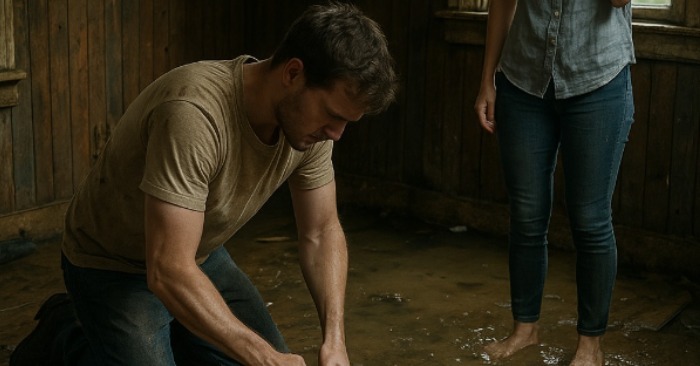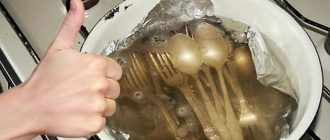When Emily and Mark’s old house was flooded during a severe storm, they thought it was just another household nuisance. A pipe burst in the kitchen, water flooded the rooms, and by morning the floors were swollen and uneven, and the house smelled of damp and old wood.
Emily sat by the window, holding a cup of cold coffee.
‘We’ll have to replace everything,’ she sighed.
Mark, kneeling with a crowbar in his hands, was not pleased.
‘Yes, the floorboards can’t be dried out. Everything will have to be replaced,’ he muttered.
Mark had inherited the house from his grandfather — an old, pre-war house with thick walls and heavy beams. There had never been a basement underneath it, at least according to his mother. They had lived here for only a year, enjoying the peace and comfort, and never thought that there could be anything else hidden under their floor.
When Mark pried up the first board, cold, musty air escaped from underneath.
‘Can you feel that?’ he frowned.
Emily came closer. ‘It’s like a draught… But where is it coming from?’
He pried up a few more boards, and suddenly the crowbar struck metal with a dull clang. A minute later, they were both standing looking at what had been revealed before them: a rusty metal hatch with a round handle in the middle.
‘This can’t be,’ Emily whispered. ‘There’s no basement in this house.’
‘Then we were wrong,’ Mark replied, but his voice trembled.
He grabbed the ring and pulled. The cover gave way with a creak. A cold, damp breeze blew out from under it. Stone steps led down into the darkness.
‘Mark… maybe we shouldn’t go down there?’ Emily said uncertainly.
He smiled. ‘Do you really want to leave it like that?’
The torch trembled in his hand as they began to descend. The steps were damp, the walls brick, crumbling in places. At the bottom of the stairs was a small room. The ceiling was low, the air heavy. There were traces of soot on the walls, as if candles had been burning here. In the corner stood an old table covered in dust, with rusty tools, glass jars and a locked metal box on top of it.
Mark placed the lantern on the floor and pried open the lid. The lock cracked and the lid fell off. Inside were yellowed papers, several photographs, and a small wooden cross.
Emily took the envelope with trembling hands. It was inscribed in faded ink:
‘To those who find this.’
She opened the letter. The handwriting was nervous and uneven:
‘If you are reading this, it means the hiding place has been found. This house holds something that should not have been found. Here are the names of those who disappeared and those who took them. If you value your peace of mind, close the hatch and forget what you have seen.’
‘What is this nonsense?’ whispered Emily.
Mark leafed through the papers: names, dates, short notes — ‘left at night,’ ‘heard footsteps,’ ‘found by the river.’
‘It looks like a diary… or a report,’ he muttered.
Suddenly, a door slammed upstairs. Silence. The lantern flickered.
‘It’s the wind,’ Mark said quickly.
But when they went upstairs, the door to the living room was closed. They had left it open before going downstairs.
And at the doorstep — fresh footprints from wet boots.
Emily looked at Mark.
‘You did take your shoes off, didn’t you?’
‘Of course I did,’ he replied hoarsely.
At that moment, a quiet sound came from under the floor. It sounded like someone knocking three times.
Knock… knock… knock…
Mark turned sharply towards the hatch. The cover slowly lowered by itself, creaking with metal. Emily screamed and stepped back, pressing the letter to her chest.
The hatch closed. Silence fell over the house again.
She looked at the sheet of paper and turned pale. Below the old inscription, fresh, dark ink was now visible:
‘Welcome home.’
Since then, Emily and Mark have lived in this house… but every night, quiet footsteps can be heard coming from under the floor, as if someone is still waiting for the trapdoor to open again.







